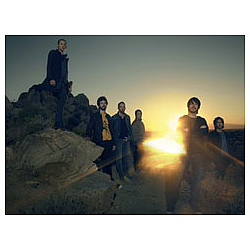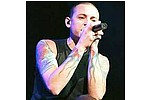Linkin Park's A Thousand Suns unfolds like a film.
Linkin Park have constructed an intricate and infectious enigma of an album that opens up a tiny bit more with each listen. Whether it's the cyber punk hunt on "When They Come for Me" or the dreamy reprieve of "Robot Boy," each song remains part of a larger framework, and that's the true genius of A Thousand Suns. Certainly "Wretches and Kings" and "The Catalyst" stand on their own with unshakable hooks and unfathomable depth, but they also contribute to a groundbreaking vision. That vision encompasses hard rock, industrial, electronica, hip hop and every other genre under the sun unlike anything that's come before—making A Thousand Suns a real tough act to follow. Linkin Park built an album for the ages that must be experienced from front-to-back, just like any classic movie. Then again, the scenes or songs, whatever you want to call them, each explode vibrantly by themselves.
Given that cinematic sensibility, it's no surprise that Linkin Park vocalist Chester Bennington can burn up the celluloid. In Saw 3D: The Final Chapter, Bennington gets himself into a pretty crazy situation with not much time to escape. He brings the same intensity to his work on the big screen that he does in the studio and on the stage, and the results are pretty mindblowing.
Linkin Park singer Chester Bennington sat down with ARTISTdirect.com editor and Dolor author Rick Florino for an exclusive interview about crafting A Thousand Suns, the story behind "The Messenger," why Saw 3D: The Final Chapter rules and so much more.
Watch the first video from this interview below! Part two will post October 25, 2010. Don't miss Saw 3D: The Final Chapter in theaters on October 29, 2010! Pick up A Thousand Suns now.
Did you view A Thousand Suns as a complete body of work from the moment you entered the studio?
Well, we definitely had a vision; we weren't quite sure exactly what that vision was going to sound like at the end. We knew that we wanted to make an album that was less focused on making songs that were easily played on radio. Those are things that we've always been very conscious of when we're writing. For A Thousand Suns, we wanted an album that felt like it was being delivered to you as a whole from the beginning to the end. It's something that's greater than the sum of its parts. It wasn't just a group of songs that were thrown together because they were the best tracks. These were very well thought-out. When we chose to do the interludes like the sound bites from the Martin Luther King speech, Oppenheimer and Mario Savio, all of those things fed really well into the themes, the feelings and the emotional elements of the record. In that sense, there was a very clear concept going from the beginning. We were like, "Let's make something that doesn't feel like it falls into an obvious Linkin Park record."
You strike a clear balance between hope and desolation across the landscape of A Thousand Suns. Was that an intent?
From the beginning, we knew that we wanted to have an album that ebbed and flowed really well. We wanted the songs to really go in and out of each other, but we weren't thinking, "Let's tell a story of oppression, fear, war, religion and all of these frictions that are happening in the world and throw in some glimmers of humanity, hope and optimism!" It wasn't like that. I feel like we would've had a hard time following that kind of strict creative design. If it was that pre-meditated, I think we would've struggled with it. However, what we found when we were writing the songs—especially when we started writing lyrics—was that there seemed to be a thread that kept coming in and out. Where there was fear, in the next song there was a little bit of remorse and yet there was also the idea of being able to come to terms with that. If we placed all of these things in the right order, that was the big key at the end. We captured a story that wasn't really intended to be told. It just worked out that way at the end, which was kind of a happy accident.
Do acting and creating music come from the same creative space for you? Was acting in Saw 3D: The Final Chapter similar to performing on stage?
I think there are similarities, and there are differences. When you're acting, there's a character that's basically already been written out. You just have to find the nuances of the personality. That takes a little bit of creativity. Getting out of the frame of mind that you're not that person requires a little thought. In terms of writing a record, it's totally different because there's no pre-meditated idea. I don't sit down and go, "You know, I want to write a song about an elf," and then write a song about an elf. [Laughs] I just don't do it that way; I let things flow. I really stopped chasing down ideas a long time ago, so it's a very organic, open-ended experience, whereas acting is a very detailed, described situation that's already been thought-out before you even get the script. Now, it's just a matter of decoding the actual personality of the character.
What drew you to the Saw franchise? Was it the cleverness of it?
Honestly, the first Saw film is the greatest horror film of all time, if you ask me. That's just the way it goes [Laughs]. Automatically, I literally jumped right in from the very first movie. Anytime a new Saw film came out, I was right there opening day. This opportunity came about in a very unorthodox way. One of my band neighbors is Mark Burg who produces the films. It was mentioned that I was brought up as a huge fan of the Saw films. Mark asked if I'd want to be in the movie and, of course, I said, "Yes! That's the coolest thing ever." I just jumped at the chance and hoped I wouldn't make an ass of myself [Laughs].
Or get blood on anything…
Getting blood on stuff is totally fine! If there was no blood, I'd be disappointed. If I was like the mailman who stumbled across a trap and then I walked off, I'd be disappointed. I wanted some blood!
What's the story behind "The Messenger"?
That song actually came to me almost entirely all at once. The second I heard the chord progression, the melody came and then the words came. It literally dawned on me like a flood, which is very rare. Usually, songs come in pieces, but this song came right away! Thank God, there's technology in my phone that allows me to record ideas whenever they arrive. Initially, I started the song off with a line that's not in there anymore. I began with, "You are a child with so many choices. The hardest always make us cry." Right away, I knew I was going to write a letter to my kids, basically. It's telling them you're getting ready to go out into the world, you're going to get kicked around, it's going to be tough and you're going to find yourself in some painful situations, but here's what's important—you're always going to be loved by your family, and that will always get you through. That's going to be the one lifeline that you have which will pull you through all of this chaos around you. Eventually, what ended up coming out of that is the song you hear on the record. It's such a vulnerable, open and very honest song in that way. We really felt like we wanted to replicate that original recording of the guitar and vocal in the phone as much as possible. We recorded the vocal, and we didn't put any special sauce on it or anything. We didn't double the vocals, and we didn't try to go for the perfect performance. I just sang it with my heart. Brad [Delson] played guitar. Mike [Shinoda] sat in the other room, and we all played it together. It was presented in the simplest way, and that's what we've got.
Does Saw 3D remind you of any songs?
I'm glad that they asked me to put "Condemned" in the movie because I really felt like that would've been a great song for the film. I didn't really think about it at the time. I kicked the idea around, but I didn't want to plan that seed. I wanted that to come organically, and it did. Dead By Sunrise's "Condemned" is now in the film, and I think it fit.
Is there a plan for more Dead By Sunrise music?
I would say that there may be a chance for that stuff. I don't know. It was such a random thing for me to make that record in the first place. With the direction Linkin Park has gone in, I no longer feel like if I go home and write a piano ballad and I want there to be steel guitar in it, that's going to be off the table because it's not this heavy rap-rock thing. I think it'll become more and more difficult for me to choose which songs would not into the realm of Linkin Park.
What was your interpretation of the character you get to play in Saw 3D?
It was actually a little more difficult than I expected because it took a lot for me to figure out how to portray this guy and what exactly his motives were going to be throughout. I thought maybe I was overthinking it, and I met with this really great acting coach who helped me walk through and make sense of the, "Motivation." [Laughs] It really came down to the fact that I'm in a sticky situation in this scene, and I've got to figure some shit out real quick.
What do you think of A Thousand Suns? Are you excited to see Chester in Saw 3D: The Final Chapter?
Read our review of A Thousand Suns here!
Write a comment
Chester Bennington News
| Title | Date | ||
|---|---|---|---|
| 1 | Chester Bennington takes Stone Temple lead Stone Temple Pilots have reformed (again) but with Linkin Park's Chester Bennington as lead singer.Bennington has been announced officially as … | May 25, 2013 |


